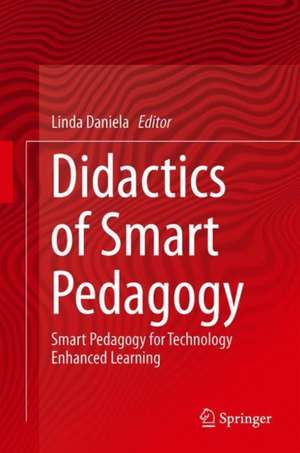Didactics of Smart Pedagogy: Smart Pedagogy for Technology Enhanced Learning
Editat de Linda Danielaen Limba Engleză Hardback – 6 dec 2018
Preț: 1125.86 lei
Preț vechi: 1373.00 lei
-18% Nou
Puncte Express: 1689
Preț estimativ în valută:
215.43€ • 225.53$ • 178.26£
215.43€ • 225.53$ • 178.26£
Carte tipărită la comandă
Livrare economică 05-19 aprilie
Preluare comenzi: 021 569.72.76
Specificații
ISBN-13: 9783030015503
ISBN-10: 3030015505
Pagini: 484
Ilustrații: XXXV, 478 p. 81 illus., 59 illus. in color.
Dimensiuni: 155 x 235 x 31 mm
Greutate: 0.93 kg
Ediția:1st ed. 2019
Editura: Springer International Publishing
Colecția Springer
Locul publicării:Cham, Switzerland
ISBN-10: 3030015505
Pagini: 484
Ilustrații: XXXV, 478 p. 81 illus., 59 illus. in color.
Dimensiuni: 155 x 235 x 31 mm
Greutate: 0.93 kg
Ediția:1st ed. 2019
Editura: Springer International Publishing
Colecția Springer
Locul publicării:Cham, Switzerland
Cuprins
Provisional Table of Contents for the volume:
- Principles of teaching and learning in the context of smart pedagogy
- Learning theories in context of smart pedagogy.
- Cognitive development in the context of smart pedagogy
- Knowledge construction principles
- Motivation
- Sensor (motor) development in smart learning environments
Recenzii
“This book arrives with timely advice about the future of education. … This book is for educators who aspire to be artists with technology enhanced learning.” (Ernest Hughes, Computing Reviews, April 18, 2019)
Notă biografică
Linda Daniela is a Professor in the Faculty of Education, Psychology, and Art at the University of Latvia in Riga.
Textul de pe ultima copertă
The focus on smart education has become a new trend in the global educational field. Some countries have already developed smart education systems and there is increasing pressure coming from business and tech communities to continue this development. Simultaneously, there are only fragmented studies on the didactic aspects of technology usage. Thus, pedagogy as a science must engage in a new research direction—smart pedagogy. This book seeks to engage in a new research direction, that of smart pedagogy. It launches discussions on how to use all sorts of smart education solutions in the context of existing learning theories and on how to apply innovative solutions in order to reduce the marginalization of groups in educational contexts. It also explores transformations of pedagogical science, the role of the educator, applicable teaching methods, learning outcomes, and research and assessment of acquired knowledge in an effort to make the smart education process meaningful to a wide audience of international educators, researchers, and administrators working within and tangential to TEL.
Caracteristici
Offers innovative pedagogical strategies for effective learning within TEL environments
Provides methodologies for in-service teachers for developing metacognitive processes and evaluating digital learning materials in TEL environments
A valuable resource for institutions and businesses who develop technologies and technological solutions for education
Provides methodologies for in-service teachers for developing metacognitive processes and evaluating digital learning materials in TEL environments
A valuable resource for institutions and businesses who develop technologies and technological solutions for education
